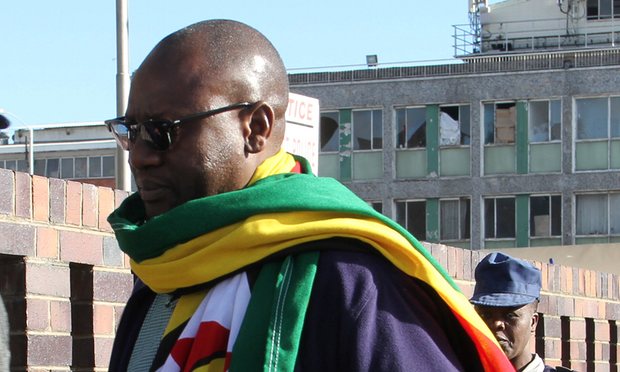Source: The Guardian (UK)
Evan Mawarire, who has been in hiding since suspected abduction attempt, held after leading national shutdown last week

#ThisFlag movement leader Evan Mawarire, a 39-year-old pastor, arrives at a police station Harare on Tuesday. Photograph: Philimon Bulawayo/Reuters
The leader of popular protests in Zimbabwe has been charged with inciting public disorder as authorities move to break up a wave of opposition in the unstable southern African state.
Evan Mawarire was summoned to a police station in the capital, Harare, on Tuesday morning, where he was questioned before being charged with public order offences. The 39-year-old pastor will be held in cells until he is brought before a magistrate on Wednesday.
Mawarire led a shutdown last week that paralysed major cities as staff stayed away from many offices, schools and banks. The demands of his #ThisFlag movement include the sacking of corrupt ministers, the payment of delayed salaries and the lifting of roadblocks that residents say police use to extract bribes.
A further two-day shutdown is planned for later this week.
The move against Mawarire, who had been in hiding following what appeared to have been an attempted abduction, is part of a broader attempt to end the protest movement.
“He’s good. In good spirits. Let’s take the system on and move forward,” said a close associate immediately after the arrest.
In Bulawayo, the southern city that has been a focus of protests in recent weeks, Thabitha Khumalo, an opposition MP, was also called in for questioning by police.
Other activists and protesters have been arrested and detained. Some have been bailed in recent days.
Lawyers representing Mawarire have argued that he has always called for non-violent protests and so cannot be guilty of inciting public disorder.
In an interview with the Guardian last week, the pastor called on the international community to put pressure on the government of the 92-year-old autocrat Robert Mugabe to “listen to its own citizens”.
“The [government] has stolen our money. It is out of touch with the problems we have … This is a non-violent movement, and must remain non-violent. It’s a confrontation of truth,” he said.
Strikes by public sector workers including teachers, doctors and civil servants, merged with the #ThisFlag protest last week. Many have now been paid arrears that had been outstanding for months, in some cases, and the same convergence of opposition may not be seen in the protests planned for Wednesday and Thursday. Their scale may be significantly reduced as a result, observers say.
The wave of arrests is likely to have an impact too. During last week’s protest, scores were injured and more than 100 demonstrators were arrested.
International campaigners have long criticised Zimbabwe for its poor record on human rights. In March last year Itai Dzamara, a 36-year-old journalist who led a peaceful protest movement, was abducted by armed men.
Officials have described the protesters as “terrorists” and have blamed foreign powers for sabotaging the economy and stirring unrest. Ignatious Chombo, the ruling Zanu-PF party’s administration secretary, accused western embassies in Harare and opposition parties of trying to cause anarchy. The Zimbabwe Broadcasting Corporation described last week’s shutdown as a “flop”.
Observers say the pressures on Mugabe, Africa’s oldest leader, and on his party are immense. Mugabe has led the former British colony since independence in 1980. A series of controversial measures during the last 20 years – such as stripping white farmers of land more than a decade ago – have caused massive economic disruption. In 2009, hyperinflation forced Zimbabwe to adopt foreign currencies – largely the US dollar – after its own currency collapsed. In 2013, Zanu-PF won an election amid widespread claims of vote rigging.
Now the government is struggling to finance its $4bn (£3.1bn) annual budget. Foreign investment and donor support has dried up and anticipated aid from China has not materialised. Officials have toured western and African capitals seeking loans, while negotiations have continued with the International Monetary Fund.
In April the government halved its 2016 growth forecast to 1.4% – an estimate that independent economists believe is optimistic. A drought threatens up to 4 million people with famine. A ban on imports has hit poor people particularly hard, effectively destroying much of the informal commercial sector.
Analysts say these challenges come as an increasingly intense internal battle rages between factions in Zanu-PF seeking to take power when the increasingly frail Mugabe dies, which has significantly weakened the ruling clique’s ability to govern.
Some observers suggest divisions in the party over Mugabe’s successor has spilled into state security organs and it may become more difficult to rely on the police to quell unrest when officers are angry at not being paid.
David Coltart, a veteran opposition politician and former minister, said it would be wrong to underestimate “the determination of the military and those in power to hold on at all costs.
“It is a pretty sobering thought. Tensions are very high at the moment and the economy will continue to run down. The Zanu-PF hope the IMF will bail them out in the nick of time. They will use the laws of the country to crack down and hang on to power at all costs. They have too much to lose.”
Source: The Guardian (UK)